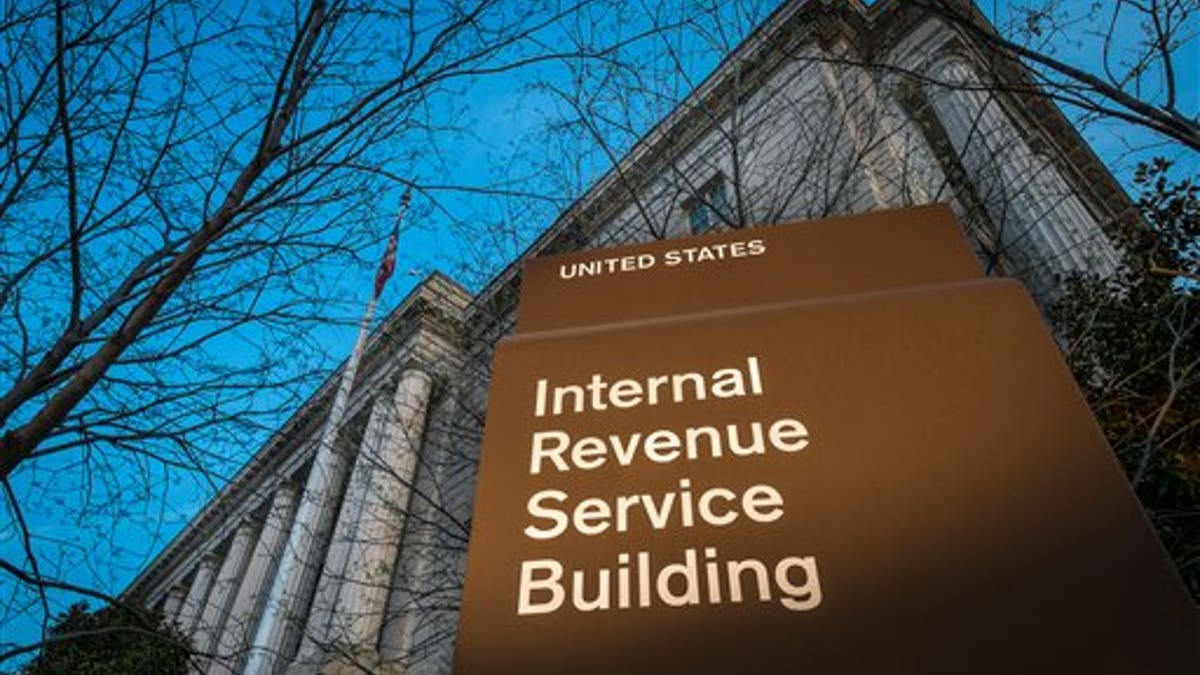
This photo taken April 13, 2014 shows the headquarters of the Internal Revenue Service (IRS) in Washington at daybreak. Tuesday, April 15, is the federal tax filing deadline for most Americans. (AP Photo/J. David Ake)
The IRS is still able to target certain political groups despite being publicly exposed for the unfair practice more than five years ago, according to a new report by a watchdog group.
A rule in place at the IRS allows the federal agency to delay the applications of non-profit groups looking for tax-exempt status, claims the Washington-based Cause of Action in its report, “A Hidden Cause of the IRS Targeting Scandal.” The IRS admitted in 2013 that leading up to the 2012 election the agency unfairly targeted right-leaning groups as well as those with “Tea Party” or “patriot” in their name. More than five years after the practice was exposed, Cause of Action says the IRS has not made changes to end the practice.
“The regulation that allows them to do this is still there,” John Vecchione, executive director of Cause of Action told Fox News. “It’s bureaucratic inertia until someone makes a change.”
The findings claims the IRS is able to target these groups while still complying with its own rules. Cause of Action claims changing this practice would be a simple and quick fix.
“The IRS has the authority to change its internal policy at any moment, which means it can remove the problematic rules at its discretion,” the authors of the report said in their findings. “Doing so would eliminate the agency procedure than enabled the targeting scandal. To date, the agency has not made the required changes to its rules.”
Officials for the IRS refute the report’s claims.
“The IRS strongly disputes the report and any suggestion or allegation that Exempt Organizations is targeting taxpayers,” reads a statement provided to Fox News. “The IRS emphasizes that this point has been confirmed by independent third parties, including the Treasury Inspector General for Tax Administration.”
“There should be absolutely no doubt on that point, and the continuing commitment by the IRS to be guided by the tax law and nothing else.”
IRS officials also said that the report “misunderstands” the process in which some groups are flagged for further review. Those that receive heightened scrutiny are called “sensitive cases” by the IRS.

Former IRS official Lois Lerner on Capitol Hill in May 2013 during hearings looking into whether agents improperly scrutinized applications for tax-exempt status by tea party and other conservative groups. (AP/J. Scott Applewhite)
“They are used within the IRS to bring to upper management’s attention cases that may generate press or Congressional attention, present unique or novel issues, or affect large numbers of taxpayers,” reads the statement. “It’s important to note that IRS internal guidelines on sensitive case reports do not instruct the employees to stop working a case or direct employees on how to work a case.”
Fox News first reported on the IRS allegations in February 2012 after it obtained letters to tea party groups sent by the federal agency that demanded information about their politics, contributors’ lists and even family members.
"Some of what they (the IRS) asked was reasonable, but there were some requests on there that were strange," Toby Marie Walker, president of the Waco Tea Party told Fox News at the time. "It makes you wonder if they do this to groups like ACORN or other left-leaning groups.”
The chapters that received requests were registering for nonprofit status as a 501(c)4 organizations. The classification mainly differs from 501(c)3 groups in that donors cannot deduct their contributions from their taxable income.
The tax code places fewer restrictions on 501(c)4 groups, allowing them to lobby to further their organizations' missions. They are also permitted to engage in political activity like endorsing candidates and donating money and time to specific campaigns, though it cannot be their primary activity.
The more tightly controlled but more heavily subsidized 501(c)3 groups may not participate in political activity.
Tea Party leaders say they were particularly offended by demands that they not only name donors and volunteers, which is required by law, but were also asked to list any political ambitions of board members or their relatives.
Many of the Tea Party chapters thought the timing of the requests was suspicious.
The IRS eventually apologized for the practice.
“That was wrong,” Lois Lerner, an IRS division head, told the Associated Press at the time. “That was absolutely incorrect, it was insensitive and it was inappropriate,” she said. “That’s not how we go about selecting cases for further review. The IRS would like to apologize for that.”

